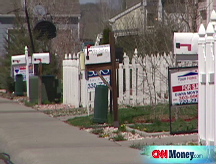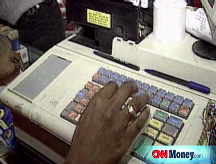Consumer confidence in surprise gain
The Conference Board's key measure increases slightly in July after a six-month slide.
NEW YORK (CNNMoney.com) -- A key measure of consumer confidence rose modestly in July after declining for six months in a row, according to a report issued Tuesday.
Despite the small improvement in consumer sentiment from June, consumer outlook remains "very pessimistic," according to the report by the New York-based Conference Board, a business research organization.
The board said its Consumer Confidence Index rose to 51.9, up from a revised 51 in June. Economists had expected the index to decline to 50, according to a consensus compiled by Briefing.com.
While the July measure showed some improvement over the previous month, the board said that consumers' perception of the economy has not shifted dramatically.
"Consumers' assessment of current conditions was little changed, suggesting there has been no significant improvement, nor significant deterioration, in business or labor market conditions," said Lynn Franco, Director of The Conference Board Consumer Research Center, in a statement.
While the consumer confidence number increased in a month-over-month comparison, the reading was still much lower than it was even in May, when the reading stood at 58.1.
"In arithmetic terms, yes it is higher, but in economic terms this is still bad, severely depressed," said Robert Brusca, chief economist at Fact and Opinion Economics. "This is certainly not a rebound in economic terms," added Brusca.
"We are kind of focused on month-to-month changes," said Brusca. "That is a relative standard."
In order to really understand how the reading fits into a bigger picture, however, Brusca said that the Consumer Confidence measure for July needs to be considered "in absolute terms."
Consumer confidence in July 2007 stood at 111.9. "Up and down the line, these are extraordinarily weak numbers," said Brusca.
Present conditions. The Present Situation Index, which measures where the average consumer feels the economy is right now, was virtually unchanged at 65.3 versus 65.4 last month.
Consumers' read on the economy right now remained grim, according to the report.
Those who think business conditions are "bad" increased slightly to 32.8% from 31.9%, but those claiming business conditions are "good" also rose to 13.1% from 11.5% last month.
Those Americans saying jobs are "hard to get" increased to 30.3% from 29.7% in June, and those claiming jobs are "plentiful" declined to 13.5% from 14.1%.
On Friday, the U.S. Department of Labor will announce the unemployment rate for July. The unemployment rate is expected to tick up to 5.6% from 5.5% in June, according to a consensus estimate from Briefing.com.
The most recent reading on initial claims for unemployment benefits came in 406,000 for the week ended July 19, according to the Labor Department.
Future conditions. The Expectations Index, which measures what consumers think will happen to the economy in the coming months, increased moderately to 43 from 41.4 in June.
"Looking ahead, while consumers remain extremely grim about short-term prospects, the modest improvement in expectations, often a harbinger of economic times to come, bears careful watching over the next few months," said Franco.
While consumer sentiment remained mostly negative, "we have had some good news in the month in terms of energy prices breaking off," said Brusca.
The survey period for this reading was July 22, and while gas prices at the pump had not come off significantly at that time, Brusca said consumers understand that falling crude oil prices will eventually mean cheaper gas prices.
Consumers who think business conditions will get worse in the coming six months decreased slightly to 32.4% from 33.5%, and those expecting conditions to improve increased to 9.3% from 8.5% in June.
But consumers remained pessimistic about their job prospects.
Consumers expecting fewer jobs in the months ahead increased to 37.1% from 35.7%, and consumers expecting more jobs remained virtually unchanged at 8.2%.
However, Americans expecting their paycheck to increase rose to 14.2% from 13.1%.
The index - based on a survey of 5,000 U.S. households conducted for The Conference Board by TNS - had declined for six months in a row before reversing direction in July. The index uses 1985 as its benchmark, setting the index at 100. ![]()



